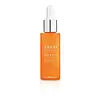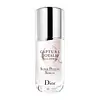What's inside
What's inside
 Key Ingredients
Key Ingredients

 Benefits
Benefits

 Concerns
Concerns

 Ingredients Side-by-side
Ingredients Side-by-side

Water
Skin ConditioningButylene Glycol
HumectantPropanediol
SolventGlycerin
HumectantRubus Chamaemorus Fruit Extract
AntioxidantRubus Chamaemorus Seed Extract
Skin ConditioningPhenoxyethanol
PreservativeBetaine
HumectantPEG-40 Hydrogenated Castor Oil
EmulsifyingSaccharide Isomerate
HumectantAscorbyl Glucoside
AntioxidantXylitylglucoside
HumectantSodium Hyaluronate
HumectantXanthan Gum
EmulsifyingAnhydroxylitol
HumectantTrehalose
HumectantUrea
BufferingDisodium EDTA
Hydrolyzed Hyaluronic Acid
HumectantMaltodextrin
AbsorbentXylitol
HumectantEthylhexylglycerin
Skin ConditioningSodium Hydroxide
BufferingSodium Citrate
BufferingAdenosine
Skin ConditioningPentylene Glycol
Skin ConditioningSerine
MaskingCitric Acid
BufferingAlgin
MaskingCaprylyl Glycol
EmollientDisodium Phosphate
BufferingGlyceryl Polyacrylate
Pullulan
Potassium Phosphate
BufferingLimonene
PerfumingLinalool
PerfumingCitral
PerfumingParfum
MaskingWater, Butylene Glycol, Propanediol, Glycerin, Rubus Chamaemorus Fruit Extract, Rubus Chamaemorus Seed Extract, Phenoxyethanol, Betaine, PEG-40 Hydrogenated Castor Oil, Saccharide Isomerate, Ascorbyl Glucoside, Xylitylglucoside, Sodium Hyaluronate, Xanthan Gum, Anhydroxylitol, Trehalose, Urea, Disodium EDTA, Hydrolyzed Hyaluronic Acid, Maltodextrin, Xylitol, Ethylhexylglycerin, Sodium Hydroxide, Sodium Citrate, Adenosine, Pentylene Glycol, Serine, Citric Acid, Algin, Caprylyl Glycol, Disodium Phosphate, Glyceryl Polyacrylate, Pullulan, Potassium Phosphate, Limonene, Linalool, Citral, Parfum
Water
Skin ConditioningGlycerin
HumectantNiacinamide
SmoothingButylene Glycol
HumectantSqualane
EmollientLimnanthes Alba Seed Oil
Skin ConditioningPentylene Glycol
Skin ConditioningAlcohol
AntimicrobialPropanediol
SolventBetaine
HumectantDiglycerin
HumectantLauroyl Lysine
Skin ConditioningPEG-8
HumectantAframomum Angustifolium Seed Extract
Skin ConditioningPaeonia Lactiflora Root Extract
Skin ConditioningLilium Candidum Bulb Extract
Skin ConditioningJasminum Officinale Flower Extract
MaskingSodium Surfactin
CleansingSodium Acetylated Hyaluronate
HumectantHydrolyzed Soy Protein
HumectantAscorbyl Glucoside
AntioxidantSodium Tocopheryl Phosphate
AntioxidantAdenosine
Skin ConditioningXylitol
HumectantTrehalose
HumectantPalmaria Palmata Extract
Skin ProtectingSodium Hyaluronate
HumectantHydroxyethyl Acrylate/Sodium Acryloyldimethyl Taurate Copolymer
Emulsion StabilisingBoron Nitride
AbsorbentCaprylyl Glycol
EmollientHydrogenated Lecithin
EmulsifyingParfum
MaskingChlorphenesin
AntimicrobialAlcaligenes Polysaccharides
EmollientPolysorbate 60
EmulsifyingSorbitan Isostearate
EmulsifyingCI 14700
Cosmetic ColorantCI 60730
Cosmetic ColorantSodium Benzoate
MaskingPotassium Sorbate
PreservativeTocopherol
AntioxidantWater, Glycerin, Niacinamide, Butylene Glycol, Squalane, Limnanthes Alba Seed Oil, Pentylene Glycol, Alcohol, Propanediol, Betaine, Diglycerin, Lauroyl Lysine, PEG-8, Aframomum Angustifolium Seed Extract, Paeonia Lactiflora Root Extract, Lilium Candidum Bulb Extract, Jasminum Officinale Flower Extract, Sodium Surfactin, Sodium Acetylated Hyaluronate, Hydrolyzed Soy Protein, Ascorbyl Glucoside, Sodium Tocopheryl Phosphate, Adenosine, Xylitol, Trehalose, Palmaria Palmata Extract, Sodium Hyaluronate, Hydroxyethyl Acrylate/Sodium Acryloyldimethyl Taurate Copolymer, Boron Nitride, Caprylyl Glycol, Hydrogenated Lecithin, Parfum, Chlorphenesin, Alcaligenes Polysaccharides, Polysorbate 60, Sorbitan Isostearate, CI 14700, CI 60730, Sodium Benzoate, Potassium Sorbate, Tocopherol
 Reviews
Reviews

Ingredients Explained
These ingredients are found in both products.
Ingredients higher up in an ingredient list are typically present in a larger amount.
Adenosine is in every living organism. It is one of four components in nucleic acids that helps store our DNA.
Adenosine has many benefits when used. These benefits include hydrating the skin, smoothing skin, and reducing wrinkles. Once applied, adenosine increases collagen production. It also helps with improving firmness and tissue repair.
Studies have found adenosine may also help with wound healing.
In skincare products, Adenosine is usually derived from yeast.
Learn more about AdenosineAscorbyl Glucoside is a stable form of Vitamin C. It is created by combining glucose from starch.
When applied to skin, Ascorbyl Glucoside turns into Ascorbic Acid.
Ascorbyl Glucoside is an antioxidant. Antioxidants help fight free-radicals, or molecules that may damage skin cells.
It can help to reduce redness, improve skin texture, reduce the effects of aging, reduce the visibility of dark spots, and brighten skin.
Read more about other types of Vitamin C:
Learn more about Ascorbyl GlucosideBetaine is a common humectant (a substance that promotes retention of moisture). It's known to be gentle on the skin and can help balance hydration.
This ingredient is best for improving hydration and soothing irritated skin. Studies also show it helps even out skin tone.
Fun fact: Betaine is naturally created in the skin and body. The kind found within cosmetic products can be either plant-derived or synthetic.
Another name for betaine is trimethylglycine.
Learn more about BetaineButylene Glycol (or BG) is used within cosmetic products for a few different reasons:
Overall, Butylene Glycol is a safe and well-rounded ingredient that works well with other ingredients.
Though this ingredient works well with most skin types, some people with sensitive skin may experience a reaction such as allergic rashes, closed comedones, or itchiness.
Learn more about Butylene GlycolCaprylyl Glycol is a humectant and emollient, meaning it attracts and preserves moisture.
It is a common ingredient in many products, especially those designed to hydrate skin. The primary benefits are retaining moisture, skin softening, and promoting a healthy skin barrier.
Though Caprylyl Glycol is an alcohol derived from fatty acids, it is not the kind that can dry out skin.
This ingredient is also used as a preservative to extend the life of products. It has slight antimicrobial properties.
Learn more about Caprylyl GlycolGlycerin is already naturally found in your skin. It helps moisturize and protect your skin.
A study from 2016 found glycerin to be more effective as a humectant than AHAs and hyaluronic acid.
As a humectant, it helps the skin stay hydrated by pulling moisture to your skin. The low molecular weight of glycerin allows it to pull moisture into the deeper layers of your skin.
Hydrated skin improves your skin barrier; Your skin barrier helps protect against irritants and bacteria.
Glycerin has also been found to have antimicrobial and antiviral properties. Due to these properties, glycerin is often used in wound and burn treatments.
In cosmetics, glycerin is usually derived from plants such as soybean or palm. However, it can also be sourced from animals, such as tallow or animal fat.
This ingredient is organic, colorless, odorless, and non-toxic.
Glycerin is the name for this ingredient in American English. British English uses Glycerol/Glycerine.
Learn more about GlycerinParfum is a catch-all term for an ingredient or more that is used to give a scent to products.
Also called "fragrance", this ingredient can be a blend of hundreds of chemicals or plant oils. This means every product with "fragrance" or "parfum" in the ingredients list is a different mixture.
For instance, Habanolide is a proprietary trade name for a specific aroma chemical. When used as a fragrance ingredient in cosmetics, most aroma chemicals fall under the broad labeling category of “FRAGRANCE” or “PARFUM” according to EU and US regulations.
The term 'parfum' or 'fragrance' is not regulated in many countries. In many cases, it is up to the brand to define this term.
For instance, many brands choose to label themselves as "fragrance-free" because they are not using synthetic fragrances. However, their products may still contain ingredients such as essential oils that are considered a fragrance by INCI standards.
One example is Calendula flower extract. Calendula is an essential oil that still imparts a scent or 'fragrance'.
Depending on the blend, the ingredients in the mixture can cause allergies and sensitivities on the skin. Some ingredients that are known EU allergens include linalool and citronellol.
Parfum can also be used to mask or cover an unpleasant scent.
The bottom line is: not all fragrances/parfum/ingredients are created equally. If you are worried about fragrances, we recommend taking a closer look at an ingredient. And of course, we always recommend speaking with a professional.
Learn more about ParfumPentylene glycol is typically used within a product to thicken it. It also adds a smooth, soft, and moisturizing feel to the product. It is naturally found in plants such as sugar beets.
The hydrophilic trait of Pentylene Glycol makes it a humectant. As a humectant, Pentylene Glycol helps draw moisture from the air to your skin. This can help keep your skin hydrated.
This property also makes Pentylene Glycol a great texture enhancer. It can also help thicken or stabilize a product.
Pentylene Glycol also acts as a mild preservative and helps to keep a product microbe-free.
Some people may experience mild eye and skin irritation from Pentylene Glycol. We always recommend speaking with a professional about using this ingredient in your routine.
Pentylene Glycol has a low molecular weight and is part of the 1,2-glycol family.
Learn more about Pentylene GlycolPropanediol is an all-star ingredient. It softens, hydrates, and smooths the skin.
It’s often used to:
Propanediol is not likely to cause sensitivity and considered safe to use. It is derived from corn or petroleum with a clear color and no scent.
Learn more about PropanediolSodium Hyaluronate is hyaluronic acid's salt form. It is commonly derived from the sodium salt of hyaluronic acid.
Like hyaluronic acid, it is great at holding water and acts as a humectant. This makes it a great skin hydrating ingredient.
Sodium Hyaluronate is naturally occurring in our bodies and is mostly found in eye fluid and joints.
These are some other common types of Hyaluronic Acid:
Learn more about Sodium HyaluronateTrehalose is a disaccharide made of two glucose molecules (glucose is sugar!). Trehalose is used to help moisturize skin. It also has antioxidant properties.
As a humectant, trehalose helps draw moisture from the air to your skin. This helps keep your skin hydrated.
Due to its antioxidant properties, trehalose may help with signs of aging. Antioxidants help fight free-radical molecules, unstable molecules that may damage your skin.
In medicine, trehalose and hyaluronic acid are used to help treat dry eyes.
Some animals, plants, and bacteria create trehalose as a source of energy to survive freeze or lack of water.
Learn more about TrehaloseWater. It's the most common cosmetic ingredient of all. You'll usually see it at the top of ingredient lists, meaning that it makes up the largest part of the product.
So why is it so popular? Water most often acts as a solvent - this means that it helps dissolve other ingredients into the formulation.
You'll also recognize water as that liquid we all need to stay alive. If you see this, drink a glass of water. Stay hydrated!
Learn more about WaterXylitol is a humectant and prebiotic. It can help with dry skin.
In studies, xylitol has been shown to improve dry skin. It decreased transepidermal water loss, or when water passes through the skin and evaporates. Xylitol also showed to help improve the biomechanical properties of the skin barrier.
The prebiotic property of xylitol may also help reinforce our skin's natural microbiome. Having a healthy microbiome prevents infection by bad bacteria and helps with hydration.
As a humectant, Xylitol helps draw moisture from both the air and from deeper skin layers. This helps keep skin hydrated.
Xylitol is a sugar alcohol and commonly used as a sugar substitute. It is naturally occurring in plants such as strawberries and pumpkin.
Learn more about Xylitol